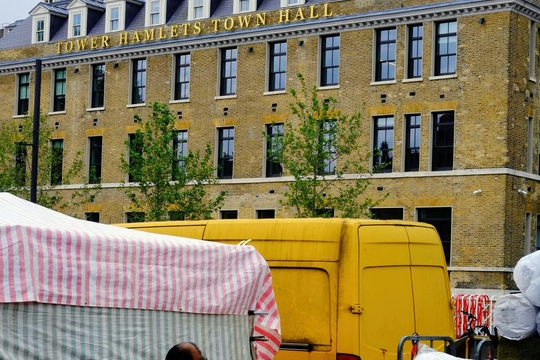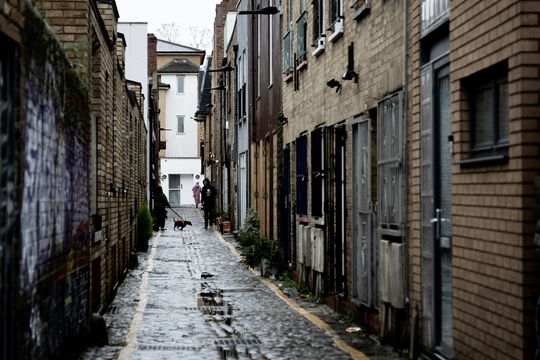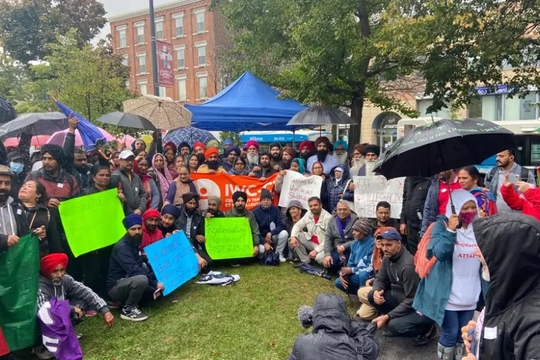Organising in Tower Hamlets
by
Kay Ballard
November 5, 2024
Featured in Worker Centres: Locations of Class Power (#22)
Kay Ballard discusses her extensive experience in organising within Tower Hamlets, highlighting the community’s historical resilience and need for a worker centre.

inquiry
Organising in Tower Hamlets
by
Kay Ballard
/
Nov. 5, 2024
in
Worker Centres: Locations of Class Power
(#22)
Kay Ballard discusses her extensive experience in organising within Tower Hamlets, highlighting the community’s historical resilience and need for a worker centre.
What is your experience of organising in Tower Hamlets?
I’ve never been seen as an organiser. I’m seen as someone with a lot of knowledge and a lot of contacts. I suppose that historically, my family have always been involved in organising, whether that was the Battle of Cable Street or involvement in different strikes. My family has always had their fingers in the pie somewhere. Because my family has been here for such a long time, you can understand what path you’re on because of where you’ve come from. We were always a political family and it was important to stick up for yourself, roll your sleeves up, and get involved in organising.
I knew about unions because I was brought up in that generation. But because I was a woman, I was never invited to actually join a union. I was working on the docks in the Canary Wharf area, surrounded by dockers and lorry drivers. But no one ever sat me down and said “are you in the union?” I worked as a wharf clerk for a company that imported steel. German steel was being brought in for the car factories. It wasn’t until I moved to working for the Post Office that I became involved in unions. My dad died of cancer caused by asbestos in the 1980s, and I needed to get a better-paid job then. My wages doubled overnight, mainly because I was working so much overtime. The docks were starting to dwindle and I was spending my time delivering prospectuses for the privatisation of BP. It was a sign of the times.
When I started working at the post, I joined the union. However, they didn’t want women to be union reps at the time. I was in the job only nine months before I was out on strike. We went on strike for the “recruitment area supplement.” This was where the post would bribe you to stay in the job, particularly in areas where it was hard to keep workers in the post. Some workers would take a year to get onto the full wage. The supplement meant that some workers got the money from day one. The union said if you pay one worker in full, you pay everyone in full. Liverpool went out on strike, and we refused to handle their post. Once the post hit London, back then, it all came through Mount Pleasant. This was the heartbeat of the post in London. Once Mount Pleasant was out, it shut down London.
After that, I went into what was called the “24-hour office.” We were on the late shift, and keeping a union rep was hard. So I decided to step up to the plate and become the first female union rep. I had no training, but I just got involved. In terms of my experience of unions, I just started with a mindset of fighting for justice. A lot of people thought of the union as just industrial, but we organised the sports and social committee. We organised charity events, a tuck shop, trips down to the coast, all sorts. There was the social side and the industrial side to our union. This is rare today. Union branches in the borough might do an event, the least they’ll do is a barbecue. In most sectors people don’t have a chance to step back and breathe. You need to have a moment to breathe to organise a social event. If you’re stuck fighting the industrial side day and night you can miss out on it. But it needs to be done.
What kind of organising are you involved in now?
I’m now part of Unite Community as I’m not working anymore. I’m involved in all sorts through Unite. For example, I’ve been involved in organising with bus drivers. Most of them are in private rented accommodation and are on the worst terms and conditions. A lot of them are TUPE’d out from garage to garage, passed from one contract to another by Transport For London (TfL). Recently one of the bus garages, come 9am on a Monday, put posters up on the wall saying “We’re no longer doing TfL contracts in this depot”, and the drivers were none the wiser. So what happens to all these bus drivers? TfL has to scramble to fulfil these contracts to keep the routes going, but no one is worrying about these drivers. They will get pushed into a new garage with no union recognition, which is some small family-owned business that has decided they can take on a TfL contract. TfL aren’t interested in dealing with the small companies.
A lot of these things aren’t new, you know? My family has been here since the 1850s and they were living in houses owned by private landlords. That is why people from that generation fought for council housing, not social housing, but that type of secure tenancy. People say that work has changed, that it’s different now, and that we work in the service industries. Years ago, the service industries would have been maids and butlers tied to houses. Now it’s hospitality, the cleaners, the delivery workers, all these people going house to house. Fashion changes, as do the dates on the calendar, but that is pretty much the big change. We’re still fighting the minimum wage issue, which the dockers were fighting back then for wages and a minimum of four hours, and that is now what our zero-hour contract workers are fighting. Back then, it was “precarious” work too. They try to convince us that everything has changed, because they want us to think that things have gotten better. But no, it hasn’t. If anything, it has gotten worse. It’s like an old building that’s falling into pieces. They hope that a new lick of paint will mean we won’t see the cracks and all the nonsense behind it.
I have been doing some research on the Trades Council in Bethnal Green. It turns out we’ve been quite rebellious in the past, who would have thought! Remember that it has only been Tower Hamlets since the 1960s, before that we were individual boroughs. My mum’s birth certificate has Middlesex on it. But in Bethnal Green, apparently, we caused a lot of trouble back then. The 1926 general strike was really strong. They organised a soup kitchen, resisted bailiffs, and all sorts.
That community spirit is still in Tower Hamlets, but we must understand that we can fight today. They had street gossip then, we’ve got social media now. Back then, street gossip could get news from one end of the borough to the other in three minutes flat. I knew that as a kid. I could be talking to someone about something and by the time I got home, they knew it, chapter and verse. They had community halls, clubs, places you could organise from across the whole borough. We knew people in the print industry who could get you a cheap leaflet quickly. People came together to fund resources for the community. Take the Labour Party Office on Cambridge Heath Road. That was built by people buying a brick for a penny. Not that they would let us use that space anymore.
What has the trades council been doing in Tower Hamlets?
I became the interim chair of the Trades Council last year. I went to an event up at Congress House and heard someone talking about Trades Councils. It got me thinking that we needed to restart one in Tower Hamlets. I was trying to be patient with building it back up. Some people thought there were more important things to be doing, but for me, if we can’t win at work, at the coalface, how are we going to win anything else? We need to get unions in the borough organised. Some disputes happen across the borough, and unions haven’t been able to coordinate very well. For example, the strikes at the Royal London Hospital needed support, but with 14 unions active there, we needed a way to coordinate. We have a lot of picket lines, which is brilliant in some ways, but in others, it can be pretty depressing. We’re fighting across the borough, but different groups of workers need support. There are a lot of problems in the borough. We need a space where all the unions can come together across sectors. We shouldn’t be doing things behind closed doors.
The bosses will always try to grind us down to a pulp. You get coal, coke, and then you get dust. The coal is better than the coke. It burns better and hotter. The coke is just coal with the guts taken out of it, and then the dust is what’s left behind. The trouble is that the dust creates a lot of smoke. So if you’re left burning the dust, you’ll get smoked out. I have had a lot of things explained to me over the years, but nothing has changed. We need to burn better than dust to make a change.
Most people have no idea what a Trades Council is. Why would they? They might have a vague idea of what a union is. Every generation thinks they know everything. But they’re not computers, and they don’t come preloaded. We must learn how to fight, what resources we have, and how to win things. They’ve taken away so much of our space, from community centres and places to meet on estates. They want to chip away at our foundation, so we can’t build anything new. Each thing we create needs to be built on a strong foundation brick by brick. Each brick has history. It will be a brick from fighting one battle; maybe we will lose, maybe we will win. But we used that brick again to build something new. And it is us, workers, unions, and the trades council, that are the cement in the middle. We need to hold everything together and keep it going. We are the cement in society, and the bricks are our unions, our children, our family and our neighbours - even those neighbours I don’t like.
What role do you think a worker centre can play?
At Unite Community, we have issues coming across our desk about welfare, housing, employment, immigration, and even computer education. When you’re dealing with the mindset of Tower Hamlets, you’re dealing with people that are very proud. It is hard for people to ask for help, and there isn’t a lot of trust. So what I would expect from a worker centre is a place you could walk in off the street, whether you’re in a union or not. They could help you with employment issues, with welfare, with education problems - like not being able to get your kid into school. You need to be able to walk in off the street, not have to give your full name, and no need for data to be collected. We don’t want everyone to know our business, we don’t want our laundry washed in public. A worker centre needs discretion, trust, and loyalty.
If you can’t help me, pass me on to someone who can. Take a message and explain what happens next. Don’t waffle, and don’t just say, “Go online.” People are not interested in that. Sometimes you’ll need to be an agony aunt, sometimes a legal department, and other times something else. But remember that a worker centre is just the outward-facing part. Behind the scenes, we need a workers’ beehive. We need a hive of activities with everything we need to support workers in the borough. Whether that is different languages, resources, contacts, and so on, we need the workload to be shared across people. If we can make that work, that is how you get a reputation in the community.
We can get a union branch to sponsor the cost of a freezer in the building and pay the costs, fill that up with frozen food and ready meals from the Phoenix Project in Poplar. Then, kids can come by and take a meal. They can just take the food, with no need for a name or giving any information. They can eat it here or take it home. Either way, that is someone who isn’t going hungry that day. This is what a worker centre in our borough can be: support, training, but also making sure that the community looks after itself. We can get people sharing recipes, making banners together, and using the workshop together at the back. We’re coming up towards the winter now, and kids need winter coats. This is the brutal reality of poverty in the borough. If we can provide a winter coat for a child or a warm meal, we’ve made a real difference.
We need space because workers don’t have access to it, let alone some union branches. However, we should also remember that not everyone can access the internet or a phone. People get cut off, and then they’re disconnected. We’ve got to remember that digital exclusion is a real issue in the borough. If I’m trying to run a campaign, union branch, or a strike, I need somewhere to meet. If I don’t have a laptop, is there somewhere I can use a computer? Or just take some phone calls? So if we have space, with some computers, and access to free WiFi, that can make all the difference. If technology is so amazing, why are there still physical billboards on the road? Why do we bother with leaflets - because technology doesn’t solve everything.
The key is how we make a space open to workers, the working destitute, the unemployed, the pensioners, those who are working but petrified of their landlords. Once you have a base then people in power are forced to sit up and listen. It’s also important to remember that we’ve got unions across the borough, and most don’t even have any space to meet. So it’s not only non-union workers, but a space like this can be important for union members. Think about the Royal London; they have 14 unions active at the hospital, but how often do they all get together? I bump into people all the time, both in union and not in unions, who need help.
We need to educate people for the fights ahead. A worker centre needs to remember our history. We have figures in our history like Annie Besant and Sylvia Pankhurst. Annie Besant had people coming to her house, and she had an open door. We need to remember the history of campaigners and organisers in East London. The worker centre should celebrate them, as well as have arts and culture. Do you remember the Horrible Histories books? Why don’t we have them about our unions and our working class history? We should have a horrible histories of Tower Hamlets: the history, the union fights, the good, and the bad. Let’s dig through the archives and find some stories from our past to share. Get the old banners out and make some new ones.
This area is a melting pot, and I could probably swear in 15 languages by the time I was in primary school. This is a working class community with a proud history, but we need space to organise. You can pluck any seed, and if you give it a bit of love and care, don’t drown it or freeze it, then it can grow into something. That is what the worker centre can do in Tower Hamlets, help us grow a movement into something incredible.
Featured in Worker Centres: Locations of Class Power (#22)
author
Kay Ballard
Subscribe to Notes from Below
Subscribe now to Notes from Below, and get our print issues sent to your front door three times a year. For every subscriber, we’re also able to print a load of free copies to hand out in workplaces, neighbourhoods, prisons and picket lines. Can you subscribe now and support us in spreading Marxist ideas in the workplace?


